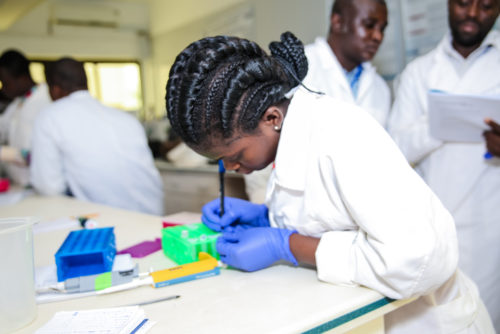The African Academy of Sciences (Kenya) and the Africa Research Excellence Fund (Gambia) have recently opened American friends funds at KBFUS to enable U.S. supporters to contribute to their important work. Focused on research and scientific inquiry, the two organizations share the goal of attracting, cultivating and nurturing home-grown talent in Africa, for the benefit of the continent and the world.

Based in Kenya, the African Academy of Sciences (AAS) is a pan-African community of scientists who aim to drive sustainable development in Africa through science, technology and innovation.
“The vision of the academy is to see transformed lives through science in Africa,” says Dr. Isayvani Naicker, Director for Strategy & Partnerships at AAS. “We have a tripartite mandate. One is pursuing excellence by recognizing and developing leading scholars in science and research through prestigious fellowship and award schemes. The second is to provide advice to governments and policy makers as they develop the continent’s science, technology and innovation research properties, strategies and policies. And third, we implement science, technology and innovation programs that tackle the developmental challenges that Africa faces.”
“My goal is to make sure we have competent African scientists who are committed to research in Africa.”
Tumani Corrah
“We achieve our mandate by forming strategic partnerships both on the continent and around the world,” Naicker says. “We are currently funded primarily through global philanthropy, including the Wellcome Trust, the Bill & Melinda Gates Foundation, and the UK Department for International Development (DFID). We initially also got an endowment from the government of Nigeria to support our work.”
Naicker says that while many African governments do invest in science, technology and innovation, they do not spend enough. “There was a commitment by African governments to spend one per cent of GDP on investment in science, but unfortunately not many have achieved this. So what we as a pan-African institution do is to see where there is a need. And by launching calls for proposals across the continent, we are trying to address this lack of funding where it exists. We work with a variety of partners and international supporters, and then disperse funds where they are needed most.”
But it’s not just about deploying the money, she adds. “It’s also very much about identifying where excellent science is being done and not only offering financial backing but also looking at what other kinds of support is required. For example, we recently launched the Research Management Program in Africa, which seeks to enhance the ecosystems for research and development on the continent to ensure that our scientists are working in environments that enable them to achieve their full potential. We support the institutions where our scientists work to build and manage the research infrastructure and environment.”
There is a need to develop the human capacity. “We also have an Affiliates Program to support younger scientists in their post-doctoral phase who are on their way to becoming independent researchers and require mentorship, networking and collaboration opportunities, or support to communicate their research.”
Naicker says that partnering with KBFUS was a way to reach a wider audience of friends who may want to support the work of AAS.
“We recognize that there are a lot of family foundations and individuals in America who are either African diaspora or have worked in Africa and who recognize the importance of investing in science, technology and innovation on the continent,” she says. “Many people who understand the challenges Africa faces want to help tackle them but perhaps don’t know how. The AAS American Friends Fund is a way for people to make a meaningful contribution and be sure it is being put to good use.”
To stay informed about news from our partners and new calls for proposals
Subscribe to the newsletter